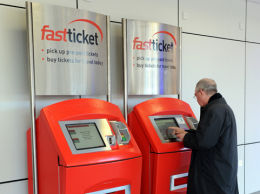Posted 3rd March 2009 | No Comments
TOCs must take rough with the smooth on fares – Adonis

Fares, like investment, can go down as well as up.
TRAIN companies must stick to their service agreements and will not be allowed to ditch the rules on regulated fares, Lord Adonis has insisted.
The rail minister told the Commons Transport Committee that next year’s regulated fares will be determined by the level of inflation in July – which is almost certain to be below zero.
It means that prices will be cut for many journeys – especially for commuters – leaving the train companies substantially out of pocket.
But Lord Adonis said they would have to adhere to the terms of their franchise agreements, pointing out they had made money during the good times and must “take the rough with the smooth”.
In fact he went further, saying he would end the current loophole allowing the TOCs to increase some regulated fares well above inflation by lowering others.
However the Government’s hardline stance raises questions about what will happen to unregulated fares, which cover two out of five journeys. And there will also be concern about the state of the finances of some companies, given that five are listed under red light for danger in the Department for Transport’s internal monitoring system.
In his first appearance be-fore the Commons Transport Committee in his new role, Lord Adonis delivered a confident performance, showing formidable knowledge about the railways, including details of timetables.
Last July the Retail Price Index was five per cent, leading to six per cent increases in January this year and causing widespread anger at a time of recession and the credit crunch. This July, the RPI could be as low as minus three per cent, meaning that under the regulated fares formula of inflation plus one per cent, prices could drop by two per cent next January.
And Lord Adonis bluntly told the committee: “Reports suggesting that we might merely freeze fares in such an eventuality are not correct.
“In the Government’s view, this would be unfair to passengers, particularly in this period of economic stress.”
He explained that train operators will in future have less flexibility over regulated journeys, as he will restrict their ability to use a ‘basket’ of fares to increase some by above RPI plus one per cent.
“In a time of economic stringency, I do not think it acceptable for individual commuters to face significantly above-average fare increases.
“The Government’s intention is that, in future, the cap should apply to individual regulated fares, not just to the average of each fares basket.
“My officials will talk to the train operators about the practical implications of making this change, but we are determined it should take effect from this coming year.”
Railnews reported last month how senior DfT official Mike Mitchell had told another Commons committee that five rail operators were ‘on red’ in the early warning system. But he insisted then that revenue was holding up well and denied reports that train operators had begged the Government for help, including rewriting franchise agreements, shortening trains and state funding for 1,000 extra rail workers.
Lord Adonis said no train company had gone to the Government and said it thought it would default on its obligations. And although traffic growth was expected to slow, the prospect of any company failing was “very small.”
